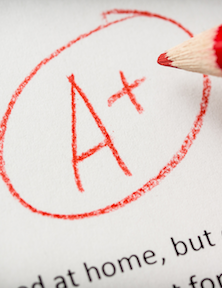By Kristy Ju
Grades have been a long-time fundamental measure used by students, administrators, graduate schools, and employers to evaluate an individual’s abilities. In recent years, reports of grade inflation in colleges and universities have gained national attention and have led to debates on grading policies at elite institutions.
A widely circulated article published last December in The Harvard Crimson quoted the Faculty of Arts and Sciences Dean Michael D. Smith as saying: “The median grade in Harvard College is indeed an A-. The most frequently awarded grade in Harvard is actually a straight A.”
Harvard government professor Harvey C. Mansfield responded, “If this is true or nearly true, it represents a failure on the part of this faculty and its leadership to maintain our academic standards.”
This kind of grade inflation leaves students and faculty with reverberating consequences. On the one hand, it may increase students’ job prospects, lead to stronger professor evaluations, and reduce students’ stress.
On the other hand, a diligent work ethic and truly great work are devalued. Another adverse effect of grade inflation is that graduate school admissions and hiring companies may make decisions based on a distorted portrayal of a student’s academic success in college.
Aware of some of these negative repercussions of grade inflation in elite colleges, several institutions have made concerted efforts towards anti-inflation. Three economists analyzed Wellesley College, a prestigious women’s liberal arts school outside of Boston. In the early 2000s, the faculty and administration at Wellesley College concluded that grade inflation and compression was problematic and had the potential to underrmine the institution’s credibility and reputation.
The faculty and staff implemented a policy in 2004 in which “average grades in courses at the introductory (100) level and intermediate (200) level with at least 10 students should not exceed a 3.33, or a B+,” according to a study published in the Journal of Economic Perspectives. However, this policy affected only courses in “high-grading” departments in the humanities and social sciences and excluded science disciplines.
The study revealed three main conclusions of the effects of the anti-inflation policy.
First, the policy was effective in achieving the overall goal of lowering average grades in “high-grading” departments.
Second, results suggest that departments affected by the grade cap experienced an approximately 30% decline in majors, indicating that students’ choices about their majors are linked with grades. For example, students may eschew “low-grading” disciplines, such as the sciences.
Third, the results demonstrate that students were displeased with their professors when the anti-inflation policy decreased average grades. There was an increase from “about 5% to slightly over 7%” in the number of student evaluations in the “do not recommend” category in the treated departments.
Wellesley College is not the only institution to adopt anti-inflation policies. In April 2004, Princeton University faculty advised that each department limit the number of students who received A’s for their course marks to only 35% and 55% for junior and senior independent work, according to a report published by an hoc committee.
Withstanding much criticism, the policy led to a recommendation from the committee to allow the university’s individual academic departments to establish their own grading standards, according to an article published in The New York Times. The committee’s report cites that the numeric caps “are too often misinterpreted as quotas.”
Moreover, many Princeton undergraduates are concerned that they are at a disadvantage when entering the job market or applying to graduate schools. The report stated that the grading policy did not negatively affect students’ admission to graduate schools, despite students’ concerns.
Grading policies in higher education have gained traction across the country in recent years, yet there are some questions still left unanswered. Will other institutions make strides toward anti-inflation, and how will they impact students, faculty, graduate school admissions departments and employers? Where is the middle ground between an inflated sense of achievement and honest evaluations of a student’s work?
Kristy Ju is a senior at University of Mary Washington majoring in English and minoring in linguistics. She became a member of Phi Beta Kappa in her junior year. University of Mary Washington is home to the Kappa of Virginia Chapter of Phi Beta Kappa.




